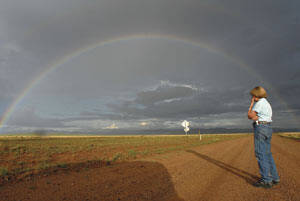Sue Krentz is a conflicted woman, coping with the complicated reality of life near the Mexican border. She hears calls for the humanitarian treatment of migrants at her church, and her family has long shown compassion to those who cross their ranch, providing water and other aid before calling the Border Patrol.
But it pains her deeply to know there was no similar compassion from whomever Rob Krentz, 58, encountered on March 27. That day her husband of 33 years was shot to death on their ranch northeast of Douglas as he made his rounds. No one has been charged for the crime.
The Krentz family’s loss soon became fuel for an already volatile debate about illegal immigration. The Arizona Legislature quickly passed a controversial bill to mandate local enforcement of immigration law. By the time a court-abridged version of S.B. 1070 was enacted on July 29, there was a constant drumbeat of news reports, talk radio and political posturing in Arizona, much of it referring to Rob Krentz’s death. Every mention of the bill now stabs at her heart. “They couldn’t just let Rob pass in peace.”
Krentz supports S.B. 1070 and had long backed such legislation, but she believes the main responsibility for fixing border problems lies with the U.S. and Mexican governments, the latter by doing more to help its own people support themselves in their own country. A lifelong Catholic, Krentz has turned to Mary and a daily 4 a.m. rosary “to get me through this.” But she chafes when her pastor at St. Luke’s preaches about the Christian responsibility to honor the human dignity of every person, no matter their legal status. “Where’s my human dignity? Where was Rob’s?” she asks.
Krentz listens to Glenn Beck’s discourses on illegal immigration and his attacks on those within the church who are leading the campaign for comprehensive immigration reform. Whether she agrees with him or not, Krentz sympathizes with those who feel they must come to the United States and worries for them.
“I understand that people are desperate,” Krentz said. “I understand that people are terrified. I understand that people have nothing; that they’re looking for a better life. But I also understand that there’s a criminal element that’s testing us.”
Long before her husband was killed, the peace and sense of security that had been a part of Cochise County ranch life for generations had been gradually eroding. Beginning in 1996 when the Border Patrol began cutting off the most heavily traveled areas for illegal crossings near San Diego and near El Paso, Tex., undocumented migrants began crossing the border farther out in the desert. Cochise County quickly became a favored route.
At one edge of the Krentz Ranch along Highway 80, Krentz pulled over to investigate a clutch of Border Patrol vehicles inside her cattle fence. Agents had just picked up 10 people walking across the ranch in 100-degree heat at midday. “People have to be awfully desperate to even attempt this,” Krentz said. “I’ve seen women here with their babies, and their babies are thirsty.... I get so mad. I get mad at the [Mexican] government for not taking care of their own people.”
It doesn’t bother Krentz that church and migrant-aid groups leave water along desert trails known to be used by migrants. “Just because I’m white and conservative does not mean I’m a Ku Klux Klanner,” she said. “It does not mean I’m not compassionate with people in need.”








